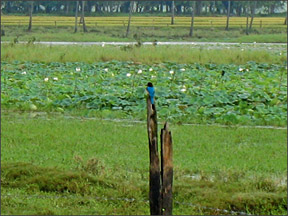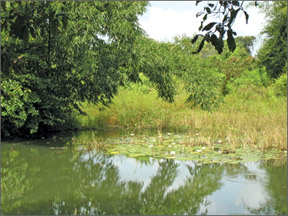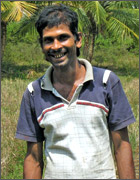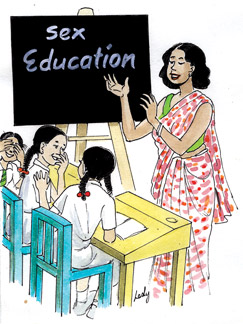
Off the main road:
Poetry in a bamboo grove
Aditha Dissanayake
|

Monarch of the wild
|
Ever met a Baron (of sorts), in your life? Try turning off the
Chilaw-Puttalam road at Bangadeniya. Head towards Pallama on the
Anamaduwa road; (the kind every driver dreams of, with the land
stretching ahead of you like a pancake, flat and smooth, so smooth it is
irresistible not to press on the accelerator till the bells go on the
speedometer), and you are there, or rather, he is there, giving you a
smile as red as a kadju puhulan.
Having passed through acre upon acre of coconut land you must turn
onto a gravel road in Andigama, flanked on both sides by thick foliage
that threaten to bruise your vehicle, before you come to the green gate
with the sign board Teal Forest written on it. Beyond the gate is the
‘castle’ and beyond the ‘castle’ is the path that leads up to a thick
jungle.
Thirty three year old Kasun Dasanayake is a Baron without a retinue,
but a Baron nevertheless. He has his own swimming pool, and seventeen
subjects on the twenty five acre kingdom where he reigns supreme.

Home grown vegetables |

Solitary sentinel |

Bamboo grove |
Not all the time, though. “Not on the days the Mahaththaya comes”
Kasun is quick to correct me. The property, he explains, is owned by a
Senior Manager of a well known group of companies in Colombo who had
bought it for its remoteness. Much later when I contact the landlord
over the phone he tells me even though some might find this remoteness
inconvenient (life without electricity or running water) or even
unsettling, this is one of the appeals the land has for him. Whenever he
visits Teal Forest, if only once a month, if only to spend one night in
the watcher’s hut, he feels this is his way of bonding with Mother
Earth, of looking after her children; from the smallest caterpillar to
the wild deer, to the peacocks and porcupines, who are made to feel the
land is theirs, that this is home.
|

Kasun Dasanayake,
‘Baron’ of Serukelle |
Meanwhile, on weekdays Kasun lives on his own in what he himself
calls is his “handmade house” because he had built it with his own
hands. As I step onto the porch I feel this is the kind of hut I would
like to make if ever I find myself stranded on a tropical island. The
floor is made of clay, the pillars supporting the roof were collected
from the shrub land which had once covered the entire twenty five acres.
“I wish I had not cut the trees to make the pillars but I had no choice”
laments Kasun, who, following in his landlord’s footsteps is keen to
preserve the environment as much as possible.
As he chats with me Kasun starts to prepare his midday meal. The
hearth has plenty of coconut kernel, collected by his wife Manika who
visits him with their two children during weekends. “Manika lives with
her parents in the Pallama town during school days because it is
difficult to take the two children to school from Teal Forest on her
push bike” explains Kasun. His lunch will be a plate of rice from the
paddy fields he had just harvested, a curry from the watakolu grown in
his backyard, and polsambol.
Kasun recalls how the land, mostly covered with dry, waist-high grass
with a dozen coconut trees, so old they gave a poor yield, had been
bought by his landlord in 2001. “At one time, the area had been a thick
forest of palu and weera trees. But these had been cut down by the first
owners in the late 1970s. They had cleared the area to plant more
coconut trees which was a mistake.” says Kasun. “Even though coconut
prices keep rising higher and higher, the soil in Serukelle is not right
for coconuts”.
Kasun thinks his master had bought the land because he was enchanted
by the cries of the teals who inhabit the water tank bordering the land.
Thus the name Teal Forest.
In keeping with his master’s wishes Kasun makes sure he does not
disturb the land in whatever endeavor he ventures upon to substantiate
the monthly income he is paid, for being the “watcher” on Teal Forest.
No back hoe was used when the two acres of teak were planted three years
ago and the paddy fields are cultivated without using chemical
fertilizers or insecticide.
The subjects on Kasun’s kingdom are the seventeen cows who roam the
land, occasionally saying ‘mooo’ to remind Kasun he is not alone on this
vast, lonely planet. From morning till about four thirty in the evening
Kasun walks all over the estate, milking the cows, plucking coconuts if
they are ripe, making vegetable plots to plant bitter gourd and green
chillies. When the sun is about to leave for his own home, Kasun too
calls it a day and takes a dip in his own swimming pool. He floats in
the water for a good thirty minutes, listening to the rustle of bamboo
leaves, and watching the water lilies swaying to the evening breeze as
if they are listening to Mozart’s music.
Our conversation drifts towards the outside world. “I heard the news
broadcast on the radio this morning.” says Kasun. “If there is a
radiation leak in Japan will it affect us? Will it mean the end of the
world?” he asks me, without a trace of worry in his voice. “Doesn’t it
bother you?” I ask him. “If it is the end of the world what would you
do?” Kasun does not answer at once. He stuffs his mouth with a betel
leaf. His eyes fall on the bamboo grove near the pond. He tells me, as
if he is reading a line from a poem written on the leaves, “on the last
day of the world, I would like to plant a tree.”
[email protected]
Should sex education be made compulsory?
Lionel Wijesiri
Savithri Gunasekera, the Colombo University’s former Vice Chancellor,
made an important statement recently. She said that lessons on child
abuse, domestic violence and sex education should be made compulsory in
school curriculums. “Some tend to think that it is not in our culture to
discuss such matters, but educating children on these issues at school
level will give them the information they need to keep them from harm’s
way. We also now have a legal system which supports this,” she added.
Prof Gunasekera also noted that adolescents acquired autonomy at 16
years of age, but there was little recognition of this fact in Sri
Lanka.
 I believe Prof. Gunasekera has a valid point. Out of the three
issues, this article concentrates only on the third, sex education.
Unfortunately, as outdated as it may sound, it is still the belief of
many that openly discussing sex and its ramifications will cause our
teens to go astray. Is this a fact or a fallacy? When we think about the
amount of sex that teenagers are exposed to each day- all of which is
glorified, does it seem like a bad idea to at least provide them with
the foundation, tools, and knowledge to help them make more responsible
decisions? I believe Prof. Gunasekera has a valid point. Out of the three
issues, this article concentrates only on the third, sex education.
Unfortunately, as outdated as it may sound, it is still the belief of
many that openly discussing sex and its ramifications will cause our
teens to go astray. Is this a fact or a fallacy? When we think about the
amount of sex that teenagers are exposed to each day- all of which is
glorified, does it seem like a bad idea to at least provide them with
the foundation, tools, and knowledge to help them make more responsible
decisions?
Especially when we consider that given our own demanding schedules,
and our aversion to the conversation itself, we often leave the youth
questioning and looking for answers from the older kid across the street
who has a ton of fancy theories of his own. These stories are likely to
be believed by the gullible youth because they have never been taught or
exposed to anything different.
If we work as a collective community unit, balancing knowledge with
morals, then we will ultimately be doing more good than harm. We will
have laid the foundation for our teenagers to grow into adults with
healthy self-images; well-informed and well-prepared not only for sex
and the responsibilities that come along with it, but for the twists and
turns that this “crazy so-called life” will undoubtedly throw at them.
Asian context
Take a look at what is happening in Asia. The state of sex education
programs in Asia is at various stages of development. Indonesia and
South Korea have a systematic policy framework for teaching about sex
within schools. Malaysia and Thailand have assessed adolescent
reproductive health needs with a view to developing adolescent-specific
training, messages and materials. India has programs aimed at children
aged nine to sixteen years. In India, there is a huge debate on the
curriculum of sex education and whether it should be increased.
Attempts by state governments to introduce sex education as a
compulsory part of the curriculum have often been met with harsh
criticism by political parties, who claim that sex education “is against
Indian culture” and would mislead children. Bangladesh, Myanmar, Nepal
and Pakistan have no coordinated sex education programs. In Japan, sex
education is mandatory from age 10 or 11, mainly covering biological
topics. In China, sex education traditionally consists of reading the
reproduction section of biology textbooks. However, some years ago, a
new five-year project was introduced by the China Family Planning
Association to “promote reproductive health education among Chinese
teenagers and unmarried youth” in urban districts and counties.
Home or school
Undoubtedly, the ideal place for sex education is the home.
Unfortunately, even the best of parents are sometimes uncomfortable
discussing the subject with their children. They may delay, waiting
until the child asks questions. Before they realize it, the optimal time
has come and gone. The child will be questioning, all right, but perhaps
the wrong people. All kinds of misinformation is passed unwittingly
between friends in the same age group.
I know a few urban parents who bought decent books for their teens to
read, believing that all the questions will be addressed and answered by
the volume’s author. However, few teens these days are interested in
reading as a leisure-time activity. The book may end up under the bed or
lying unopened on a shelf in the closet. Even the best-written, most
informative publication will do no good under these circumstances.
The alternative is then for the school to assume the responsibility
of delivering it. The basic factual information should be supplemented
by parental perspectives, and moral guidelines from home, but even if
this is not the case, the young people will at least have sufficient
information, to keep themselves disease-free.
Should sex education be left until secondary school? No, say the
sociologists. In the Primary Grades a section of the Health curriculum,
some part should introduce the children to the proper names for body
parts and explain how a baby grows inside its mother’s uterus until it
is ready to live on its own. This information would be presented within
the context of a normal family, with textbook pictures of children with
whom the students can identify.
In the Junior Grades, as the children approach puberty, the boys and
girls should be separated and each group be given information as to what
bodily changes they can expect to experience during the next few years,
as they become young men and women.
In the Secondary Grade, again in separate groups, the students should
be informed about physical changes their classmates of the opposite sex
are undergoing. These lessons should be given in a matter-of-fact
manner, using proper anatomical terms for the specific body parts
involved.
If these preparatory lessons have been presented to the students from
the Primary Grades on, the sex education of teens would only be a
continuation of an earlier curriculum. They will receive it
matter-of-factly and trust in its accuracy. It will be much more
effective than if it were dropped on them suddenly, out of the blue.
There should be no smirking, eye-rolling, giggling or other unseemly
behaviours because these latest lessons are only a grade-specific unit
of a subject they have studied since Grade One.
Pros and cons
Knowledge is power. The question is not whether teens should be
exposed to a sensitive topic like sex so early in their lives. Rather,
the question is whether not being taught about sex will help teens more
in the long run. In two words, it won’t.
Without sex education, teens have little reliable information to go
on: what they hear in play grounds and hallways is not sufficient.
Furthermore, their curiosity about an unknown and culturally forbidden
act, and the social pressures surrounding it, may influence them to make
a bad choice. Curiosity can be a powerful, overwhelming emotion.
Providing sex education in schools and eliminating that curiosity to
some degree would be helpful.
However, there are pros and cons that must be considered by parents
when dealing with sexual education classes that one would not have to
consider with a less controversial topic such as math or reading. In
general, a parent needs to be aware of his or her own family or
religious beliefs and values and know their child’s intellect and
maturity levels. However, there are disadvantages that can cause the
validity and effectiveness of the material to be in question, and if it
cannot be delivered effectively it should not be delivered at all. Some
disadvantages might be: (1) students may still suffer from embarrassment
or get excited by the topic matter.
This can cause for out-of-control classrooms if students take to
giggling or making inappropriate remarks: (2) sex education is often
viewed as a “recreational” course and not a serious subject (this is a
direct correlation to the fact that there are no grades or scores to be
derived from class): (3) teachers are not always trained how to properly
teach sex education courses and may transgress their own beliefs or
morals into the subject matter rather than stick with the facts: (4) the
attitudes of parents, educators or religious leaders in the community
can cause the subject matter to vary from province to province, or even
school-to-school.
Sex education may be one of those topics that will always share a
place on the list of debatable subjects that should or should not be
taught to our children in school. It is important to remember both the
pros and cons of this important subject and just how critical it will
become in the later years of a child’s development. |



